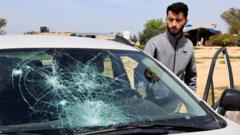In a harrowing turn of events, Palestinian film-maker Hamdan Ballal, who recently gained international acclaim by winning an Oscar for best documentary, was assaulted and detained by Israeli forces following a brutal attack by settlers. Ballal, visibly injured with a bruised face and blood-stained clothes, spoke to reporters after being released from nearly 24 hours in custody, recounting how settlers and soldiers descended upon his home on the outskirts of Susya in the occupied West Bank.
According to Ballal, the situation escalated quickly as settlers began to vandalize property and threaten his family at gunpoint. "They started beating me and threatened me with guns," he said, indicating a similar aggression from soldiers who allegedly shot rounds into the air during the chaos. Notably, while in detention, Ballal reported being blindfolded and subjected to ridicule regarding his Oscar win.
The violence that unfolded at his farmhouse resulted in his vehicle being vandalized, with slashed tires and shattered windows bearing the marks of that night’s violence. Witness Basel Adra, who rushed to the scene, described witnessing a mob of 15 settlers attacking homes, vandalizing property, and throwing rocks. "It was dangerous. I was afraid for my life," he stated, relaying the panic that set in as he encouraged others to escape.
Ballal, a well-known journalist and activist, has faced previous fallout from settlers. The Israel Defense Forces (IDF) asserted that the violence began when "terrorists" targeted Israeli citizens, leading to mutual rock-throwing between the two groups. However, witnesses like Josh Kimelman, a New Jersey native volunteering with the Centre for Jewish Non-Violence, challenged this narrative. Kimelman described how his group of activists was targeted upon arrival, suggesting that the ambush was premeditated and specifically directed at known individuals.
Activists note a troubling trend of increased settler violence, with Adra highlighting 45 attacks since the start of the year in their small village alone—pointing to a pervasive climate of fear among residents. As he awaited news of Ballal's release, which would come after he paid bail and headed to the hospital for treatment, Adra reflected on the disappointing reality that global recognition from their Oscar did little to change the dangerous conditions on the ground.
"This should have highlighted our plight, but instead, the situation remains unchanged," Adra lamented, as he clutched their Oscar statue—once a symbol of hope, now a stark reminder of the challenges they face.



















